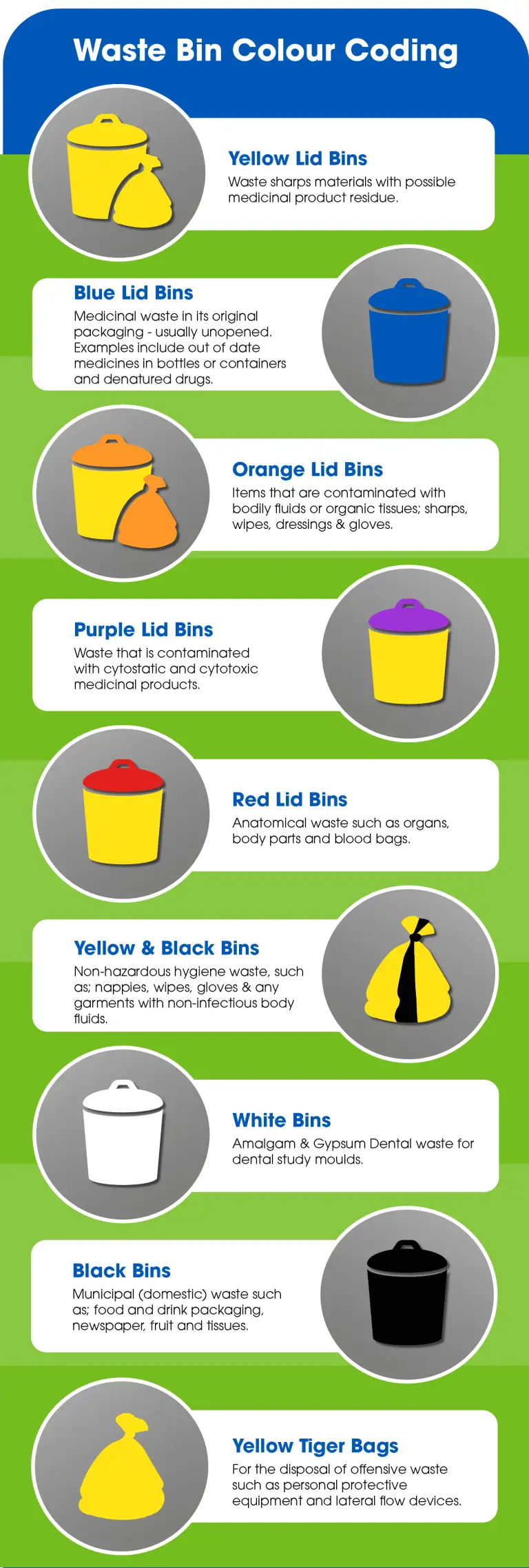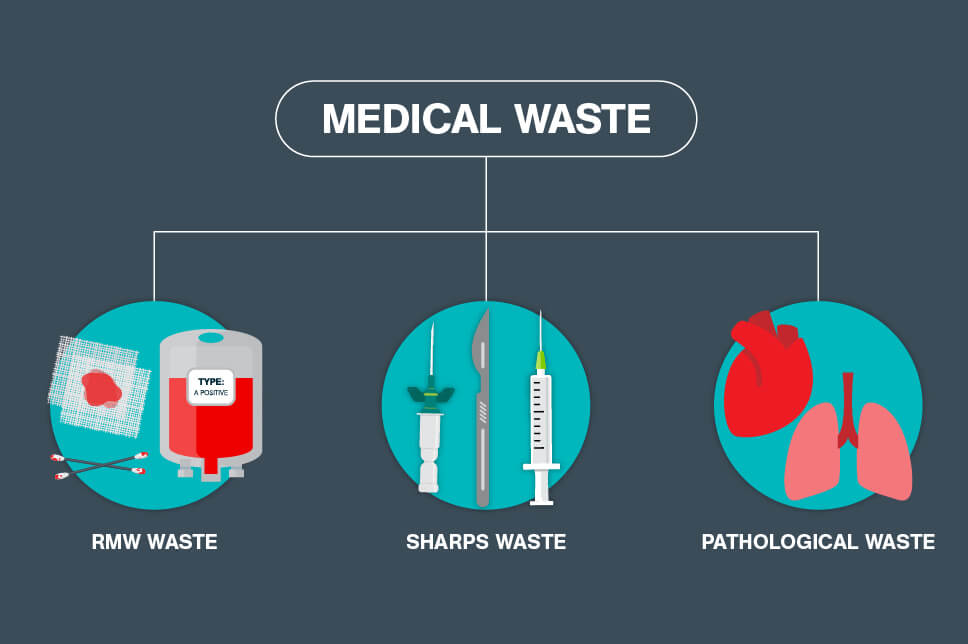Your Ally in Medical Waste Removal: Professional Service with Environmental Treatment
Wiki Article
Ensuring Safe Handling and Disposal of Medical Waste
Making certain risk-free handling and disposal of medical waste is of paramount importance in health care setups. Improper management of clinical waste can posture substantial threats to the setting, public health and wellness, and medical care employees. In this intro, we will discover the importance of correct medical waste management, the dangers connected with improper handling and disposal, as well as the standards and techniques that can be applied to ensure its safe disposal.Relevance of Appropriate Medical Waste Monitoring
Proper medical waste administration is of utmost importance in ensuring the safety and security and wellness of medical care experts, patients, and the public. Clinical waste refers to any kind of waste produced by health care facilities throughout the diagnosis, treatment, or booster shot of human beings or animals. This waste can position severe health and wellness dangers otherwise managed and taken care of effectively.
One of the main reasons proper medical waste monitoring is crucial is to stop the spread of contagious diseases. Medical waste, such as used needles, infected dressings, and biological products, can bring dangerous virus. Otherwise dealt with and gotten rid of appropriately, these pathogens can be transferred to medical care employees, patients, waste trainers, and also the basic public, leading to the possible outbreak of illness.
Additionally, correct clinical waste management helps secure the setting - medical waste removal. Medical waste consists of hazardous materials, including chemicals, drugs, and contaminated compounds. When not managed properly, these substances can contaminate soil, water bodies, and the air, presenting a substantial danger to communities and public health and wellness
In addition, efficient medical waste administration guarantees compliance with local policies and international standards. Federal governments and governing bodies have actually established standards and protocols to ensure the safe handling, storage, transportation, and disposal of medical waste. Abiding by these laws is necessary to stay clear of lawful repercussions and maintain the credibility and reputation of healthcare facilities.
Risks of Improper Handling and Disposal

If clinical waste is not correctly disposed of,Clients can likewise be exposed to these transmittable conditions. If polluted needles or various other sharps are not disposed of in designated puncture-proof containers, they might accidentally puncture clients, leading to potential infections. Additionally, if clinical waste is not set apart effectively, there is a danger of cross-contamination between different types of waste, further raising the chances of disease transmission.
Incorrect disposal of clinical waste can likewise have damaging effects on the atmosphere and the general public. If medical waste is not dealt with and gotten rid of appropriately, it can infect water sources, soil, and air, causing the spread of conditions and pollutants. This can have long-term consequences on environments and public health and wellness.
Guidelines for Safe Handling of Medical Waste
Implementing effective protocols for the safe handling of clinical waste is crucial in making sure the protection of health care specialists, patients, and the public. These standards are crucial in minimizing the threats linked with the handling and disposal of medical waste, such as infections, injuries, and ecological pollution.Most importantly, health care centers should establish a thorough waste administration strategy that sticks to regional, nationwide, and worldwide laws. This strategy should include clear guidelines on waste segregation, product packaging, storage, transport, and labeling. It is vital to separate different sorts of waste, such as sharps, contagious materials, pharmaceuticals, and non-hazardous waste, to avoid cross-contamination and advertise secure disposal.
Additionally, healthcare employees have to obtain detailed training on correct waste handling techniques. They must be enlightened on the potential risks of medical waste, the proper use of individual protective tools (PPE), and the correct treatments for managing, transporting, and disposing of different sorts of waste.
In addition, health care centers must consistently check and audit their waste management techniques to ensure compliance with guidelines. This WasteX Medical Waste Disposal consists of performing regular examinations, assessing waste handling procedures, and providing comments and training to employee.
Efficient Approaches for Waste Disposal
To ensure the risk-free handling and disposal of medical waste, it is vital to utilize efficient methods for waste disposal. Clinical waste can position considerable dangers to public health and the environment otherwise managed and dealt with properly. Healthcare facilities and waste management organizations have to apply appropriate approaches to alleviate these dangers.One efficient approach for waste disposal is segregation. It includes dividing different types of clinical waste based upon their characteristics. Partition permits the correct therapy and disposal of each waste group, minimizing the possibility for contamination or harm. Healthcare facilities should supply clear standards and training to employee on exactly how to set apart waste properly.

Furthermore, healthcare facilities need to work together with accredited waste administration companies to make certain proper disposal of medical waste. These business have the expertise and equipment called for to securely manage and dispose of medical waste in conformity with policies and best techniques.
Training and Education And Learning for Medical Care Professionals
Medical care professionals play an important duty in making certain the risk-free handling and disposal of clinical waste via detailed training and education and learning. It is vital for doctor to have a deep understanding of the possible threats connected with medical waste and the correct procedures for its administration. By receiving correct training, health care specialists can reduce the possible transmission of infectious diseases, avoid environmental contamination, and secure both themselves and the basic public.
Furthermore, training programs must emphasize making use of personal safety equipment (PPE) and proper hand health techniques when taking care of clinical waste. medical waste disposal. Health care professionals should understand how to correctly get rid of and make use of of PPE to protect themselves from possible exposure to hazardous materials. They need to also be enlightened on the relevance of regular handwashing and the proper usage of hand sanitizers to minimize the spread of contagious illness
Proceeding education and learning and regular updates on clinical waste administration methods are important for healthcare experts. As policies and guidelines advance, it is important to maintain medical care companies educated concerning any type of modifications in methods and best practices. This will make sure that they remain up-to-date and preserve a high standard of safety and security in managing and disposing of medical waste.
Verdict
In final thought, correct handling and disposal of medical waste is crucial to make sure the safety and security of medical care specialists, people, and the atmosphere. By sticking to these techniques, we can mitigate the prospective dangers connected with medical waste.Clinical waste refers to any type of waste created by health care centers during the medical diagnosis, treatment, or booster shot of animals or human beings. If clinical waste is not set apart properly, there is a danger of cross-contamination between different types of waste, more raising the possibilities of illness transmission.
It is important to divide various types of waste, such as sharps, contagious products, pharmaceuticals, and non-hazardous waste, to prevent cross-contamination and promote risk-free disposal. WasteX Medical Waste Disposal.
To ensure the secure handling and disposal of clinical waste, it is crucial to utilize effective methods for waste disposal. Furthermore, medical care facilities need to develop a normal waste collection and transportation schedule to prevent waste build-up and decrease the danger of mishaps or contamination.
Report this wiki page